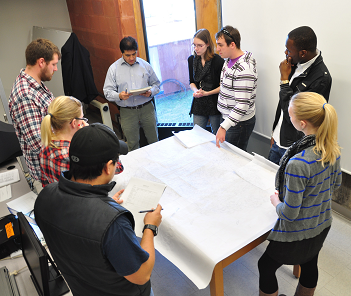GIS is central to a lot of work in geography, environment, and other fields. Knowing how to understand and apply GIS tools can benefit students in their careers after completing their degrees.
The learning of GIS in the TSE begins with our introductory course Introduction to GIS.
Introduction to GIS (GEOG-EGEO-ERSC 2090H):
Students may take this course to learn the fundamentals of map making, working with digital geographic data, gaining some experience working with ArcGIS, and performing some elementary GIS operations.
- This course requires one or more of first year Geography, ERS, or Biology.
- This course is a required course for all Geography majors.
The in-person version of GEOG-EGEO-ERSC 2090H includes workshops taking place in the TSE computer lab with all required software supplied. Students enrolled in a web-based version of this course should visit Computer Requirements for TSE GIS Courses to learn more about this course's computer and software requirements.
Intermediate GIS
Students may expand their knowledge and experience in GIS by taking one or more of several Trent GIS courses (see list below). These courses each have their own prerequisites, and may include GEOG-EGEO-ERSC 2090H (to ensure some experience with GIS) and math credits (to ensure an understanding of various data analysis techniques). Consult the Academic Calendar for details on these courses, and the Academic Timetable for which of these courses are offered in current and upcoming academic term(s).
- ERSC-GEOG 3010H: Fundamentals of GIS Analysis (requires 2080H & 2090H)
- GEOG-ERSC 3020H: Remote Sensing of the Environment (requires 2090H)
- GEOG-ERSC 4450H: Spatial Modeling with GIS (requires 3010H)
- opportunities to apply GIS in other courses, such as ERSC-GEOG 4640H, Thesis and Community-Based Research Project courses

Students conducting GIS work in a lab of ERSC-GEOG 4640H, Watershed Management.
Students have access to our dedicated and updated computer labs in the TSE.

